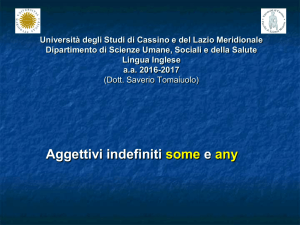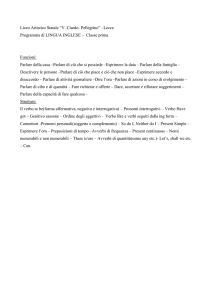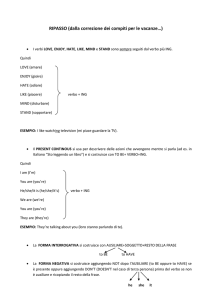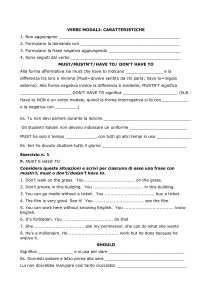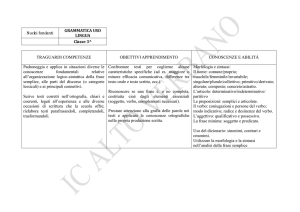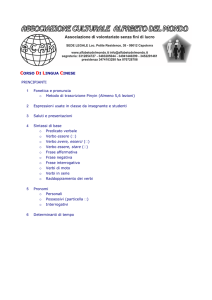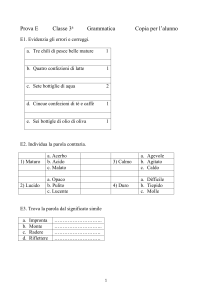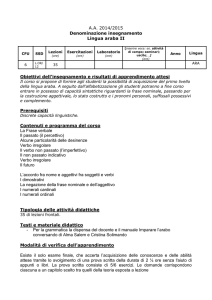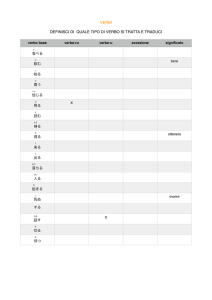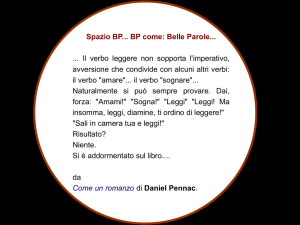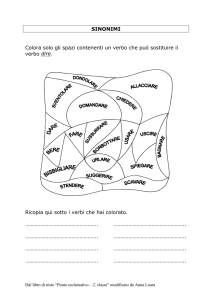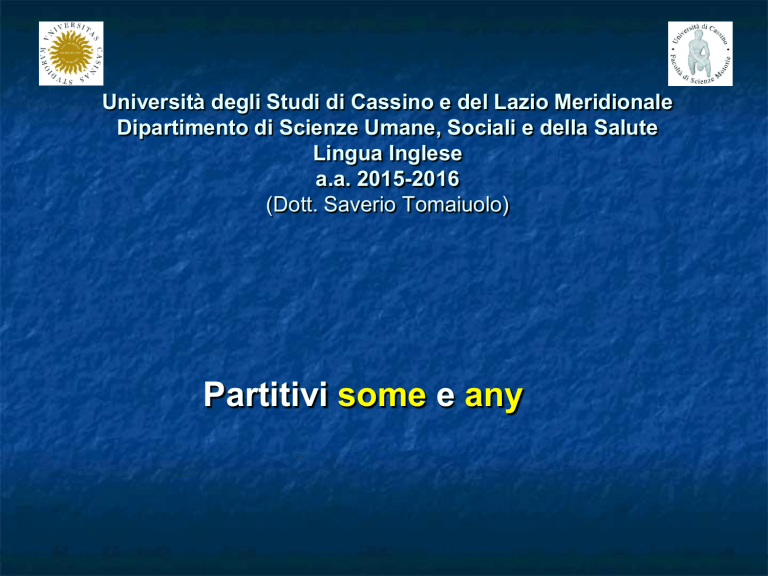
Università degli Studi di Cassino e del Lazio Meridionale
Dipartimento di Scienze Umane, Sociali e della Salute
Lingua Inglese
a.a. 2015-2016
(Dott. Saverio Tomaiuolo)
Partitivi some e any
I partitivi “some” e “any” traducono l’italiano “alcuni”,
“del”, “dei”, “delle”, “qualche” etc…e si possono
usare con i nomi numerabili al plurale (some
sportsmen, some races, any ball) o con i non
numerabili (any rain, some information, some bread,
some news; VEDI UNITA’ SUCCESSIVA).
Frase affermativa
Si utilizza generalmente some, mentre per riferirsi ad
una scelta libera (quando vuoi, tutto ciò che ti piace
etc..) si può utilizzare any:
-
I bought some expensive shoes last week.
-
You can eat any food you like.
-
Frase negative.
Si utilizza generalmente not any (oppure no):
- Do not use any drugs / use no drugs to feel free and
happy!
Frasi interrogative
Si usa generalmente any, mentre some può essere
utilizzato solo per le offerte:
- Does he have any friends? He looks alone.
- Do you have any coffee? CONFRONTA CON:
- Do you want/Would you like some coffee?
Esempi:
- She had some rest after this long walk.
- You can come any time you want.
- I don’t want any help from you / I want no help
from you
- Do you have any DVDs to lend me? No, but
would you like some books instead?
Nomi numerabili (countable nouns) e
non numerabili (uncountable nouns)
1. I countable nouns sono quei nomi che possono essere contati e
numerati e che possiedono le forme singolari e plurali, come nei
seguenti casi:
car / cars / two cars;
finger / fingers / two fingers;
boy / boys / five boys
2. Altri termini possiedono invece solo una forma e non sono
numerabili, o uncountable, come ad esempio:
Water, tea, rain, snow, food, bread, sugar, cheese, information,
luggage, news, advice, vegetables, milk, food, money, music
Per indicare le quantità con gli uncountable nouns, essi possono
essere preceduti o dall’articolo “The” o dai partitivi “Some /Any”,
come nei seguenti casi:
some water, the rain, some information, some milk, the coffee etc…
Ci sono alcuni termini non numerabili che possono divenire
numerabili, come ad esempio:
coffee (Do you have two coffees?), tea (Does she want one tea?)
Esempi:
Parents at school always need
information about their children.
some
Young people need the advice of a more
experienced person.
Do you have any luggage to declare? Yes, I
have only two small bags.
I need some water. Is it possible to have two
glasses of water, please?
Modal verbs (1): “can” al presente e al passato
Il verbo modale “can” indica la capacità o l’abilità da parte
di qualcuno/qualcosa di fare qualcosa. La sua forma al
passato è could, e può essere anche utilizzato (assieme
a may, un altro verbo modale) per le richieste cortesi,
cosa che non si può dire delle richieste con il modale
“can”, che sono piuttosto informali.
Frase affermativa
SOGGETTO + CAN [passato: COULD] + VERBO (all’infinito senza “to”)
I /you /he /she / it / we / you / they can [could] go there.
Frase negativa
SOGGETTO + CANNOT / CAN’T [COULD NOT/ COULDN’T] + VERBO
I / you / he /she / it / we / you / they cannot / can’t [could not /
couldn’t] go there
Frase interrogativa
CAN [passato: COULD] + SOGGETTO + VERBO (all’infinito senza “to”)…?
Can [could] I /you /he /she / it / we / you / they go there…?
Can you give me that book ? (informale);
Could / May you give me that book? (più formale)
Esempi:
He can run 100 metres in 10 seconds.
Can they improve their personal record?
I cannot (can’t) write faster than that!
Could you give me that t-shirt please?
Modal verbs (2):
“must” / “to have to” al presente e al
passato
Il verbo must viene adoperato per indicare un obbligo. Essendo
anch’esso un modale, valgono le medesime regole viste per can.
Frase affermativa
SOGGETTO + MUST + VERBO (all’infinito senza “to”)
I / you / he / she / it / we / you / they must study more
Frase negativa
SOGGETTO + MUST NOT / MUSTN’T + VERBO (all’infinito senza “to”)
I / you / he /she / it / we / you / they must not /mustn’t study more
Frase interrogativa
MUST + SOGGETTO + VERBO (all’infinito senza “to”)…?
Must I / you / he / she / it / we / you / they study more?
Nel casi si tratti di un consiglio (“dovresti”, “sarebbe
meglio”) si può utilizzare il verbo “to have to” (più in
uso rispetto al desueto ought to).
Le forme affermative /negative/interrogative sono le
stesse del verbo “to have” con l’aggiunta della
preposizione “to” (I have to go there, she has to train
more).
Il passato sia di must che di to have to si forma con
Had to (forma negativa: SOGGETTO + DID NOT HAVE
TO / HAD NOT TO + VERBO; forma interrogativa: DID +
SOGGETTO + HAVE TO + VERBO).
Esempi:
You must follow the rules to be fair!
He doesn’t have/ hasn’t to cycle too much to
warm up.
Must I drink this wine? No, you must not /
mustn’t.
He had to call his friend at the phone that night.
Dare/Chiedere informazioni
Regola fondamentale: usare sempre “please” alla fine della frase!!!
Chiedere Informazioni
Una strada/via: Excuse me, could you (formale)/can you (informale)
tell me where is Gower Street? It seems I got lost!
Excuse me, is the British Library Far from here?
Un nome/titolo: Sorry, I did not catch your name/the name of that
book. Could you please spell it/repeat it?
Per telefono:
Hallo? Good morning/afternoon/evening. Is it Mr.
Rossi? Could you please pass me on to him/her?
Dare informazioni
Una strada/via: It is not far from here. You just have to walk
straight, turn left/right. It is 200 metres far.
Unfortunately it is a bit far. Do you walk or do you
have a car? Take the second left and then ….
Un nome/titolo: Ok, I’ll repeat it. My name is ROSSI.
R-O-double S-I.
Per telefono:
Yes, he/she is here. I’ll pass you to him/her. Could
you please hold on a minute?
To be honest I do not now. I’ll check if he/she is
here. Could you please hold on?

